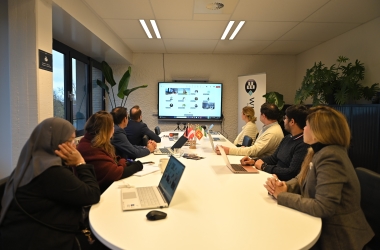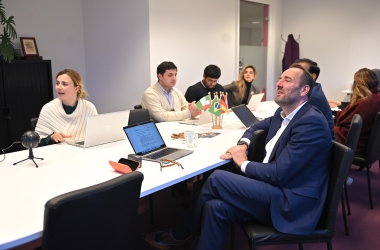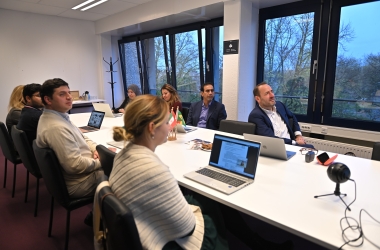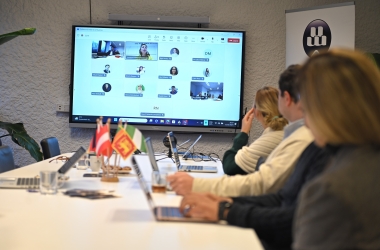Wittenborg Online News!
Wittenborg Hosts Professional Field Panel Meeting: Career Insights and Skills for Success
Wittenborg Hosts Professional Field Panel Meeting: Career Insights and Skills for Success

Wittenborg Hosts Professional Field Panel Meeting: Career Insights and Skills for Success
Rijn Platteel Leads Discussion on Wittenborg Students' Competences and Programmes
On 11 November, Wittenborg hosted a Professional Field Panel Meeting with faculty, business practitioners, and alumni to discuss key career development topics. The discussion covered career strategies, internships, soft skills like communication and teamwork, and the growing importance of language proficiency and AI skills in the workplace. As a university of applied sciences, Wittenborg aims to ensure its programmes equip students with the skills they need for the future and remains in ongoing dialogue with industry professionals and employers.
Rijn Platteel, chairman of the panel, entrepreneur and Managing Director of VNO-NCW, welcomed participants, who joined both in person in Apeldoorn and online. Platteel spoke candidly about his admiration for Wittenborg’s international community, stating:
“You may not realise it, but we [entrepreneurs] are looking for people with your skills – your international skills. You’ve seen the world, you know what it’s about, and that makes you incredibly valuable in today’s global workforce.”
Alumni Tracking Results and Career Stories
The meeting continued with a presentation by Wittenborg's Study Location & CRM Manager, Kejsi Hoxha, who analysed alumni data from the school's bachelor, MBA (Master of Business Administration) and MBM (Master of Business Management) programmes from 2012 to the present. Hoxha divided the findings by programme and nationality, providing an in-depth look at the career paths of Wittenborg alumni.
For the bachelor’s programmes, Wittenborg has seen a diverse range of graduates, with alumni from 79 nationalities and 17 specialisations. Notable countries of origin include China, the Netherlands, Nigeria, Iran and Vietnam. The most common specialisations are Economics and Management, followed by Hotel and Hospitality Services Management and Marketing and Communications.
When examining the countries of residence, 38.83% of graduates remain in the Netherlands after graduation, while others have moved to destinations like Germany, the United Kingdom and the United States. Among these graduates, many hold positions in logistics, project management and sales and marketing, with a notable number also having started their own businesses.
For the MBA programme, there are 229 graduates from 34 nationalities. The top five countries of origin are India, Iran, Nepal, Nigeria and Vietnam. The majority of graduates specialise in International Management, with 32.31% of MBA alumni from Iran. In terms of career positions, alumni hold diverse roles such as business analyst, data analyst and account payable specialist, with some also starting their own businesses.
Finally, for the MBM programme, which has 250 graduates from 52 nationalities, digital marketing and communications is the most popular specialisation, followed by event management and hospitality management. In terms of countries of residence, 58% of MBM alumni have chosen to stay in the Netherlands, followed by Germany, the United Kingdom and the United States.
Alumni from the MBM programme hold diverse positions, including project planner, business analyst and business consultant. Interestingly, education is the most common industry for MBM graduates, followed by retail, business consulting and hospitality services.

Different Motivations: Bachelor’s vs. Master’s Students
Peter Birdsall, President of Wittenborg, shared insights into the differing motivations of bachelor’s and master’s students, particularly those from outside the EU. Birdsall characterised bachelor’s students as “study tourists”. In contrast, master’s students often arrive with a clear and singular purpose: to relocate and establish themselves professionally. Birdsall noted that many master’s students come with a well-thought-out plan to secure employment post-graduation.
Career Path: From Teacher to Sustainability Advocate
Somayyeh Nowroozi, MBA in Education graduate and Product Quality & Recovery Manager at IKEA in the Netherlands, continued to share her career journey. After 17 years of teaching in Iran, Nowroozi sought a significant career change. “I was tired of teaching,” she said, deciding to pursue an MBA at Wittenborg in October 2021. Business was new to her, but she was determined to challenge herself and grow internationally.
While studying, she secured an internship at IKEA's headquarters in Haarlem, working in Talent Development within HR. Despite the language barrier, her adaptability impressed her colleagues, and she developed a passion for sustainability. This internship eventually led to her current role.
Nowroozi reflected on how Wittenborg equipped her with the skills for success, particularly through Strategic Management courses and Project Weeks, which gave her practical, hands-on experience. She suggested that more real-world exposure, such as company visits and specialist talks, could further benefit students.

Transforming Careers: Hind Albasry’s Journey
Hind Albasry, an Assistant Professor at Wittenborg with over 15 years of experience in the telecommunications sector, also shared her career path. Her talk highlighted her transformation from an engineer to an academic, offering advice on preparing students for the evolving digital world.
“In 2003, when I received my first certificate, I thought life would be easy and I’d just get a job. But I learned that without specific skills, especially soft skills, it’s not easy to succeed,” Hind explained.
She recognised the importance of developing critical thinking and problem-solving skills, which are fundamental for engineers and essential for overcoming the challenges she faced in both her career and academic pursuits.
As an educator at Wittenborg, Hind sees the school’s focus on digital transformation and AI as crucial for preparing students for future careers. She believes students need to master STEM skills (Science, Technology, Engineering, and Mathematics), as they are essential for problem solving and addressing the global challenges of today.
Self-Presentation Skills: An Essential for Career Success
Maulik Barot, Wittenborg graduate and Admissions Administrator at Wittenborg, also weighed in on a common issue students face: the gap in self-presentation skills during interviews and in the workplace. He recounted his own struggles during an internship interview and highlighted the importance of learning how to effectively present oneself.
“I remember my first interview for an internship. With the knowledge I have now, I would reject myself. I was confident that if they hired me, I would give my 100%. But the interview didn’t go well because I didn’t know how to sell myself,” Maulik admitted.
He believes Wittenborg could bridge this gap by incorporating self-presentation skills into the curriculum, enabling students to navigate interviews and job searches more effectively.

The Value of Preparation and Cultural Fit in Job Applications
Head of the School of Business Rauf Abdul offered job seekers an important reminder: "Success in the job market is about more than just ticking boxes. It’s about knowing your worth, understanding the company you’re applying to, and showing how your unique qualities and skills can contribute to their mission."
By preparing a well-crafted pitch that highlights both qualifications and personal alignment with the company, graduates can significantly enhance their chances of landing the job they desire.
The Role of Language and Adaptability in the Workplace
One attendee stressed that in the Netherlands, speaking Dutch is crucial for socialising with colleagues. They noted that without the ability to understand the language, employees miss out on a key part of workplace culture: the informal social interactions that happen in the local language. This, they explained, can affect not just your relationships with colleagues, but also your integration into the company culture.
However, the importance of language skills can vary based on the role and the industry. Some attendees shared that in regions like the Randstad (the western part of the Netherlands) or in Germany, the workplace is often highly international, and many companies operate in English. This is especially true in industries such as finance or IT, where English tends to be the common language used in global teams.
One other attendee mentioned that despite being fluent in English, they faced job rejections because certain roles, particularly in finance, required Dutch proficiency due to legal and administrative requirements. Similarly, roles in HR or other areas closely linked to the country’s laws might necessitate Dutch language skills.
Key Skills for Today’s World
On the other hand, Dr Gabor Molnar, Associate Professor, emphasised the growing importance of adaptability in today’s fast-paced world, noting:
"One of the other skills I'm looking for when I hire people is the capability to learn fast. I know it's a very difficult ask, but at the same time, things are moving so fast today, and if someone can demonstrate their ability to pick up things quickly and effectively, that’s incredibly valuable."
WUP 26/11/2024
by Erene Roux
©WUAS Press
1385 words